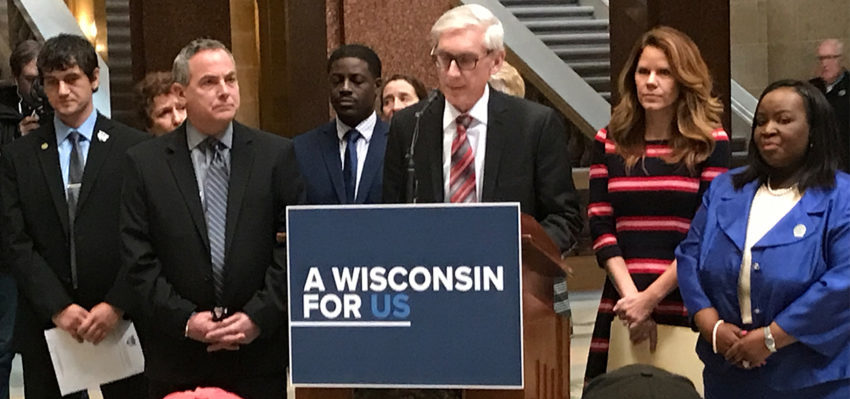 [bctt tweet=”.@DanODonnellShow systematically debunks @GovEvers claims that marijuana decriminalization will solve racial disparities in Wisconsin’s prison population. #WIright #WIbudget” username=”MacIverWisc”]
[bctt tweet=”.@DanODonnellShow systematically debunks @GovEvers claims that marijuana decriminalization will solve racial disparities in Wisconsin’s prison population. #WIright #WIbudget” username=”MacIverWisc”]
February 20, 2019
Special Guest Perspective by Dan O’Donnell
Governor Evers made it clear that his sudden push to decriminalize marijuana was not, in fact, mere political payback for the thousands of potheads who voted for him almost as an afterthought as they pulled the lever for non-binding marijuana ballot referenda this November.
No, no, he insisted. He has far nobler aims.
“This is about connecting the dots between racial disparities and economic inequity,” he said during a news conference Monday. “Bottom line is, we’re spending too much money prosecuting and incarcerating people and often people of color for non-violent crimes related to possessing small amounts of marijuana.”
Only we’re not.
In a tweet a few hours later, Governor Evers asserted that “Wisconsin has the highest incarceration rate in the country for black men, and drug-related offenses make up as much as 75-85% of inmate populations.”
This is just a flat-out lie.
The state’s two largest cities; Milwaukee and Madison—consider it a municipal violation that carries a relatively small fine and no jail time whatsoever.
According to the Wisconsin Department of Corrections’ most recent analysis of inmates, only 11% were incarcerated for drug-related offenses. 11%. Not 85%, not 75%. 11%. That number includes every single inmate currently in Wisconsin’s prison system—including those serving state sentences, federal sentences, and sentences from other states.
And that 11%, of course, comprises all drug offenses, not just those related to marijuana possession, delivery, or manufacturing.
This means that of the 23,519 total inmates in Wisconsin’s prison system, only 2,351 are in for drug offenses.
Given that first-offense possession of small amounts of marijuana is a misdemeanor in Wisconsin punishable by up to six months in jail, not prison; there are currently zero people in prison for carrying a baggie of weed.
What about all of those black men rotting away in county jails, though? What about the cost of prosecuting and incarcerating them?
It’s virtually nothing.
First time marijuana possession is a misdemeanor in Wisconsin, and local governments get to decide how to punish possession of small amounts. In Milwaukee and Madison, it’s just a fine. That makes this statement by @Govevers highly questionable at best. #WIright @DanODonnellShow pic.twitter.com/73HsGAyEeb
— MacIver News Service (@NewsMacIver) February 19, 2019
Current Wisconsin law allows municipalities to determine for themselves how to punish possession of small amounts of marijuana, and many—including the state’s two largest cities; Milwaukee and Madison—consider it a municipal violation that carries a relatively small fine and no jail time whatsoever.
Since the overwhelming majority of Wisconsin’s black and Latino populations live in or near cities that have more liberal attitudes toward possession of small amounts of marijuana and don’t consider a first offense worthy of even a day in jail, Evers’ dishonest fearmongering over the cost of “prosecuting and incarcerating people and often people of color” is downright laughable.
The cost is about the same as prosecuting speeding tickets. A community simply needs to operate a municipal court and collect the marijuana possession fines as they come in. If anything, communities make a significant amount of money off of municipal fines.
The reality is that there simply aren’t enough pot-related offenses that even rise to the level of misdemeanors (let alone felonies) to make even the tiniest dent in Wisconsin’s minority incarceration rate.
Governor Evers’ ham-handed attempt at portraying Wisconsin as a racist backwater in which every black man with a joint is sent straight to a maximum-security cell aside, his belief that he can significantly reduce the state’s prison population by decriminalizing marijuana is simply mistaken.
“By decriminalizing marijuana, we’ll begin to address racial disparities and cycles of poverty in communities across our state,” he tweeted.
The reality is that there simply aren’t enough pot-related offenses that even rise to the level of misdemeanors (let alone felonies) to make even the tiniest dent in Wisconsin’s minority incarceration rate.
While the Wisconsin Department of Corrections does not have publicly available data on how many state inmates are locked up for marijuana offenses only, federal numbers suggest that the total would be miniscule.
The U.S. Sentencing Commission found that in Fiscal Year 2017, just 42 people were sentenced to federal prison for simple marijuana possession…out of more than 200,000 drug-related cases that year.
That’s just 0.021%.
Applying that to Wisconsin’s 2,351 drug offenders currently in Wisconsin’s prison system would suggest that less than one inmate is doing time for pot possession.
This is admittedly an imperfect extrapolation, but it does tend to suggest that it is exceedingly rare for marijuana possession to result in a prison sentence.
And jail sentences for pot possession in Wisconsin are nearly as infrequent.
According to a 2015 Public Policy Forum study, arrests in Milwaukee in which small-scale marijuana possession was the only charge dropped by 54% from 2010 to 2015. That year, the Milwaukee Common Council dropped the fine for first-time possession of 25 grams or less to between $50 and…$0.
How seriously does Governor Evers think the average Milwaukee Police officer will pursue a marijuana arrest when the suspect could have to pay quite literally no fine?
It’s not just Milwaukee, either. Nearly all of Wisconsin’s largest cities have already all but decriminalized marijuana possession and smaller municipalities have been slowly following suit over the past several years, reflecting the already-changing attitudes regarding the drug.
Possession of it in the amounts that Governor Evers is talking about just isn’t landing anyone in prison or jail and isn’t costing Wisconsin much at all.
His contention, then, that his push for statewide decriminalization will somehow solve racial inequities in the justice system is either pie-in-the-sky naivety or willful dishonesty.